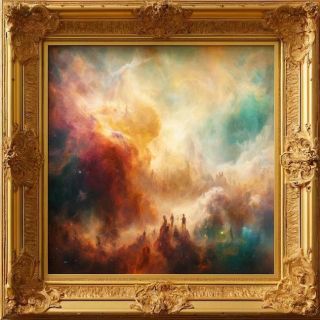Artificial Intelligence
The Evolution of Creativity
How AI is expanding the boundaries of human imagination.
Posted April 12, 2024 Reviewed by Tyler Woods
Key points
- AI in creativity is an evolutionary leap in human growth and transformation.
- AI expands creative frontiers, like the camera broadened visual art.
- AI is a tool of human ingenuity, redefining roles and reflecting our creativity.

The story of humanity is a story of creativity. And yet, every new tool and technology has been met with a mix of excitement and apprehension. From the first cave paintings to the rise of the internet, each innovation has reshaped the landscape of creative expression in profound and unexpected ways. Today, as artificial intelligence (AI) begins to make its mark on the creative world, we find ourselves at another great evolutionary leap—or, as some would say, a precipice. This "creative cliff" may offer us the opportunity to jump off and build the wings of flight or a perilous crash landing.
At first glance, the idea of AI as a creative partner can seem unsettling. How can machines, with their cold algorithms and binary codes, hope to emulate the spark of human imagination? Some fear that AI will automate away the need for human creators, flooding the market with soulless, cookie-cutter outputs. But to view AI as a threat to creativity is to misunderstand the nature of both.
Creativity, after all, is not a fixed resource to be hoarded or depleted. It is an infinite wellspring, constantly replenished by the interplay of new ideas, tools, and perspectives. Just as the invention of the camera didn't kill portrait painting but rather expanded the possibilities of visual art, AI has the potential to open up entirely new frontiers of creative expression. Did I just say selfie?
Imagine a future where AI is not just a tool, but a creative partner—a sort of intellectual soulmate that engages in a continuous, iterative engagement with the human mind. In this vision, the artist and the AI form a symbiotic relationship, a feedback loop of inspiration and refinement that blurs the line between human and machine cognition. The artist feeds the AI with prompts, sketches, or fragments of ideas, which the AI then transforms and builds upon, generating a stream of novel permutations and variations. The artist, in turn, selects curates, and refines these outputs, injecting them with human intuition, emotion, and aesthetic judgment.
This back-and-forth exchange creates a unique cognitive resonance, a sort of creative alchemy that catalyzes innovation. Through each iteration, the artist and the AI co-evolve, learning from each other and pushing each other to new heights of originality and sophistication. It's a partnership that is not merely additive, but multiplicative—the sum of their creative powers exceeds what either could achieve alone. In this model, AI doesn't replace human creativity, but rather amplifies it, creating a sort of "extended mind" that augments and accelerates the creative process. It's a glimpse into a future where creativity knows no bounds, where the synergy between human and machine opens up uncharted territories of artistic expression.
Of course, the path to this future is not without its challenges. As AI becomes more integrated into creative workflows, we'll need to grapple with the challenging questions around issues like attribution, intellectual property, and the potential for algorithmic bias. We'll need to ensure that the economic benefits of AI-assisted creativity are distributed fairly, and that the technology is used to amplify a diversity of voices and perspectives.
But these are challenges we've faced before, in one form or another, with each new creative technology. In each case, we've adapted and evolved, finding ways to harness the power of innovation while mitigating its risks. The same will be true with AI—it will require us to redefine certain roles and values, but it will also create new opportunities and niches we can't yet imagine.
In the end, the story of AI and creativity is just the latest chapter in the evolutionary epic of human ingenuity. For millennia, we've used our tools to extend the reach of our imaginations, to bring form to the formless, and to give voice to the ineffable. AI is simply the next great tool in this lineage—a mirror that focuses and reflects back to us the creativity of the human mind.


